A Girl’s War: A Childhood Lost, Part 1 of 2
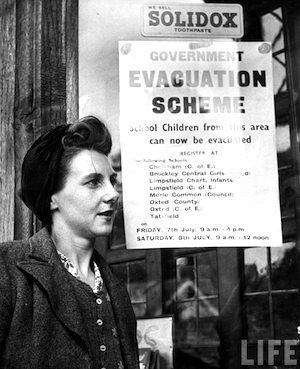
- SUBSCRIBE
- ALREADY SUBSCRIBED?
BECOME A BONJOUR PARIS MEMBER
Gain full access to our collection of over 5,000 articles and bring the City of Light into your life. Just 60 USD per year.
Find out why you should become a member here.
Sign in
Fill in your credentials below.
 Operation Pied Piper
Operation Pied Piper
The evacuation of Britain’s cities at the start of World War Two was the biggest and most concentrated mass movement of people in Britain’s history. In the first four days of September 1939, nearly 3,000,000 people were transported from towns and cities in danger from enemy bombers to places of safety in the countryside. Most were schoolchildren, who had been labelled like pieces of luggage, separated from their parents and accompanied instead by a small army of guardians – 100,000 teachers. By any measure it was an astonishing event, a logistical nightmare of co-ordination and control beginning with the terse order to ‘Evacuate forthwith,’ issued at 11.07am on Thursday, 31 August 1939. Few realised that within a week, a quarter of the population of Britain would have a new address. ~~ BBC Evacuees in World War Two – the True Story by David Prest.
On September 3, 1939, anticipating a possible German invasion, the British government, with the words, “evacuate forthwith,” launched Operation Pied Piper, the evacuation of over 1.5 million British children to the presumed safety of the countryside. On that unseasonably hot autumn day, with identifying labels pinned to their coats and gas masks hung around their necks, children gathered to participate in what adults told them was “an adventure.” If the parents thought the journey such a good idea, the children must have wondered why so many mothers were crying; and why some parents snatched back their children and took them home instead of letting them go on this “special outing.”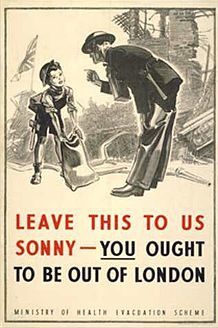
The children were chosen randomly, as one said, “like cattle in a market,” to live with unfamiliar families in unfamiliar surroundings for weeks, months and, in many cases, years. While some evacuees had a happy life and did not want to go “home” when the war ended, other children received harsh, and in some extreme cases, abusive treatment.
Maria, a thirteen year old girl, said “It was a terrifying experience leaving my mother at such short notice. We travelled by train and it was quite a long journey. I could hardly breathe. When we arrived at Wales, I was the last child to be chosen by a host family. In the end, I was chosen by a tall, healthy looking lady. But I soon found out that she was very cruel. When I got to the house she told me to take my clothes off. But when I refused, she tore off my clothes and I was forced to go into the Kitchen. Then, I was shoved into a tin bath which contained Dettol in it. Then my host father shaved my head until I was bald. The experience of evacuation has made my life a misery.” ~~ Blog, World War Two 1939-1945
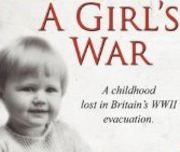 I was one of those children and in my memoir, A Girl’s War, I share my personal journey.
I was one of those children and in my memoir, A Girl’s War, I share my personal journey.
A Girl’s War recounts how I was sent to a boarding school at three years of age, abruptly separated from my parents and my brother, when my father became ill. That first Christmas I contracted measles and pneumonia and spent the holidays in the school sanitarium. My mother insisted that I be allowed to attend the Linton Camp Residential School, specifically built in 1939 for evacuees, where my brother was a pupil. Nobody told me that my father had died just before Christmas, but the “big boys” at the Linton school knew of his death because my brother, Keith, attended the funeral. The children soon made sure that I also knew of my father’s death. The move to the Linton school left me confused and fearful, mistrustful of adult promises, with a lack of trust and an extreme independence.
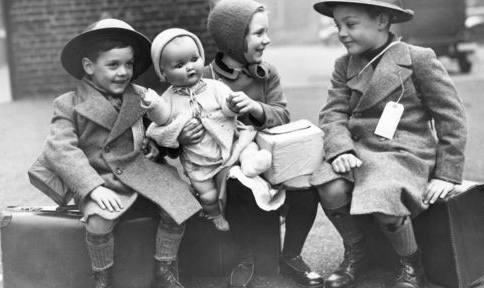
Rita Glenister, from North London, stayed with a working-class family in Somerset and was treated like a member of the family, given love and affection and secured friendships to last a lifetime. Norma Reeve, from a lowly background in the East End, was taken in by a titled lady with servants and a butler who served Norma her meals.
Little things, like going to the pictures, learning to bake bread, walks in the woods and the generosity of those who took evacuated children into their homes, have remained constant in the minds of evacuees. For many it was a life-enhancing, mind-broadening experience, leaving them with memories they treasure to this day.
Others, however, were beaten, mistreated and abused by families who didn’t want them and didn’t care about them. The painful experience of John Abbot, evacuated from Bristol, reflects the darker side. His rations were stolen by his host family, who enjoyed good food whilst John was given a diet of nothing more than mashed potatoes.
He was horsewhipped for speaking out and, with a bruised and bleeding body, was eventually taken in by the police. Then there was Terri McNeil who was locked in a birdcage and left with a chunk of bread and a bowl of water. ~~ BBC Evacuees in World War Two – the True Story by David Prest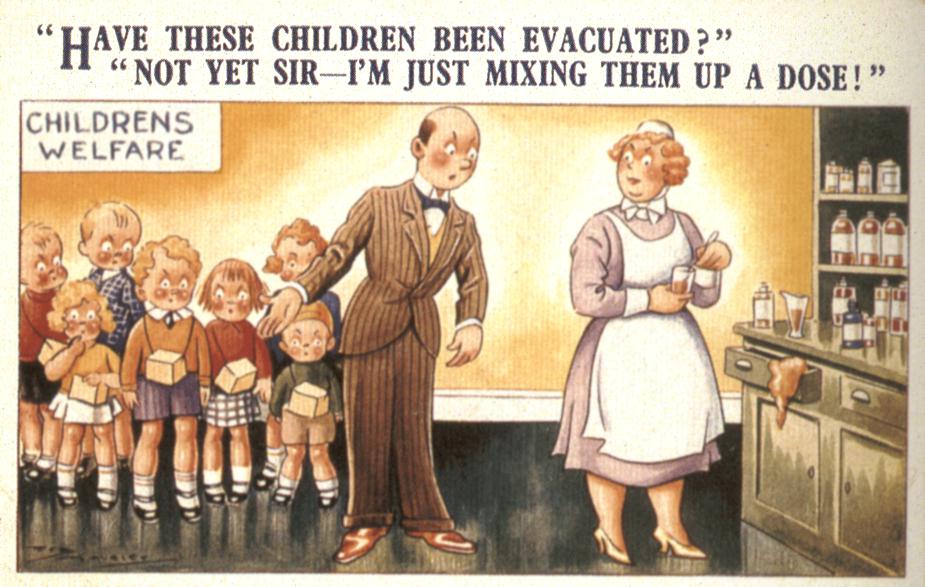
Once WWII ended in 1945, no one talked about the war or the evacuation.
When many evacuees went home, they had problems fitting into their families. Children and parents often did not recognize one another when they met after their long separations.
At war’s end too many children could not return home, their families had been killed and their homes demolished.
These were just a few of the issues that compounded the difficulties of the returning evacuees. It is hardly surprising that it was hard for many former evacuees to move on with their lives when they were unable to come to terms with their past.
The government that had taken years to prepare for the evacuation ignored the warnings of leading child psychologists that these children would need care after the war ended. The government did not collect data to discover the effects on the child evacuees. British children did not learn about the evacuation, nor, until the last two decades, was Operation Pied Piper mentioned in WWII literature.
In today’s culture, each child would have a counselor to help them make sense of their experience. In 1945, these former evacuees received no help.
The attitude of war-weary, post-war Britain was “The war is over; get on with your lives.”
Story continues in the Sunday, July 3, issue of BonjourParis.
About the Author:
Doreen Drewry Lehr, Ph.D. has written articles for magazines and journals, but this is her first book. She married Wayne R. Lehr, a US Air Force Officer in 1961 and traveled extensively throughout the world. Dr. Lehr taught at Springfield College in Manchester, New Hampshire, and at Western Michigan University. A Gold Star Wife, she lives in Washington D.C. and Key West, Florida. Doreen is also a Francophile who will spend two months in Uzes in the autumn. Check her website to read more about this book.
Not yet subscribed to BonjourParis? Sign up for your free subscription & we’ll send you 50 original stories every month from your most complete online France travel & Francophile lifestyle eZine. RSS or email.
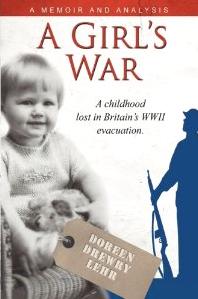 A GIRL’S WAR: A CHILDHOOD LOST IN BRITAIN’S WWII EVACUATION is a courageous narrative that includes a fascinating probe into the decisions of a country at war. Great Britain intentionally displaced the nation’s children, the very future of the country, with little regard for the damage it would cause those evacuees. A GIRL’S WAR is a long overdue account of an extraordinarily poorly conceived plan and a compelling memoir. Don’t miss this book.
A GIRL’S WAR: A CHILDHOOD LOST IN BRITAIN’S WWII EVACUATION is a courageous narrative that includes a fascinating probe into the decisions of a country at war. Great Britain intentionally displaced the nation’s children, the very future of the country, with little regard for the damage it would cause those evacuees. A GIRL’S WAR is a long overdue account of an extraordinarily poorly conceived plan and a compelling memoir. Don’t miss this book.
Did you know you can buy travelers’ essentials like luggage, guidebooks, cameras plus imported gifts for Francophiles at our BonjourParis Boutique & Amazon.com store? You benefit from competitive pricing and speedy delivery as your purchases support costs of keeping BonjourParis your most complete online France travel resource. Merci in advance for your support.

During your travels to France or elsewhere, please consider MedjetAssist medical emergency evacuation protection. As a MedjetAssist member, if you are hospitalized as an inpatient more than 150 miles from home, you will be transported at your discretion to the hospital of your choice from virtually anywhere in the world—at no additional cost. Short-term coverage starts at less than $100—less than the cost of a U.S. Urgent Care visit. BonjourParis recommends MedjetAssist for domestic and international travel. To read more, click HERE.
More in history, World War II


